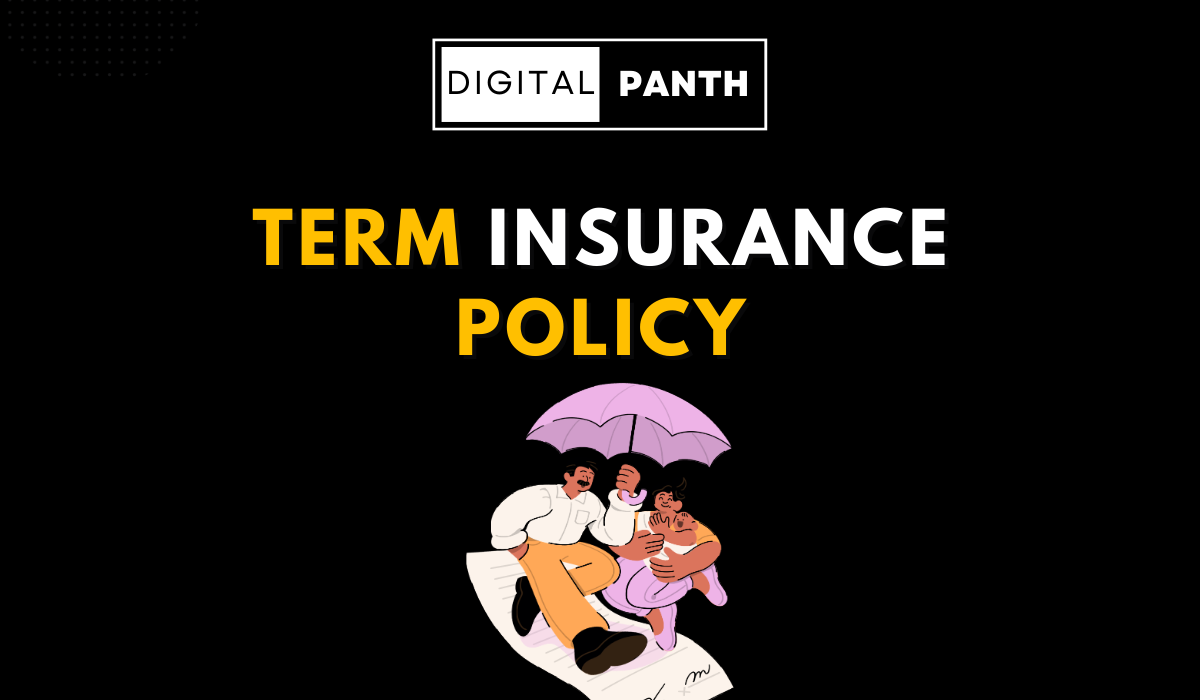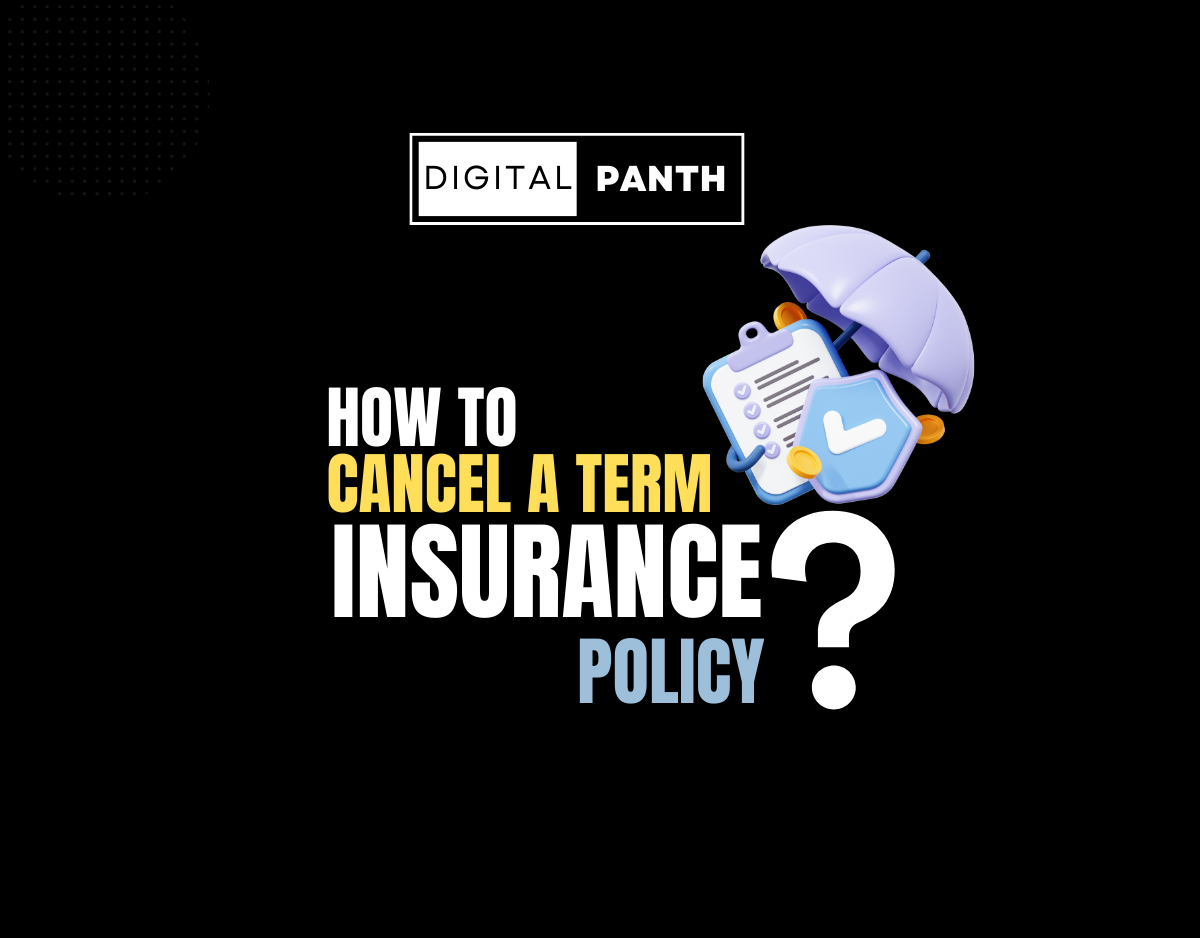Term insurance is a simple life insurance policy that covers risks for a fixed term or period of time, which is predetermined. Insurance provides financial security to the insured person’s beneficiaries through death benefit payments in case of the insured person’s untimely death within the policy term. This is the primary goal of a term insurance plan.
Term insurance is just like a legal contract between the insured and the insurer that provides a death benefit to the nominee of the insured person if the insured person dies during the policy’s term. The person who buys a term plan agrees to pay premiums to the insurance company. In exchange, the insurer promises to provide financial protection for the insured person for the rest of his or her life. The insurance coverage of a term insurance plan is only good for the term stated in the policy. Depending on the age at which you invest in the plan, the term can range from 10 to 30 years or more. It is the purest form of life insurance coverage that provides full financial protection to your family members against life risks. Your family will get life insurance or a sum assured based on the term insurance plan you purchase in the event of your untimely death during the policy period.
Read : How to Claim Life Insurance Policy?
Factors that influence long-term insurance premiums
Life insurance premium rates are determined by a fixed procedure that involves different statistical and mathematical calculations. This procedure is based on the needs and situations of the covered person. Some of the primary factors that are considered while calculating premium rates are:
- Age: Younger people are less likely to die or get life-threatening diseases. As a result, younger people are charged cheaper premiums than elderly people.
- Gender: According to several studies, women live a few years longer than men. As a result, many insurers offer cheaper premiums to women because they have a higher chance of lasting a few more years than men.
- Family Medical History: An individual whose family has a history of ailments such as diabetes or heart attack may have a higher risk of developing these conditions. In that case, they need to pay a higher premium.
- Smoking and Drinking Habits: Premium rates for smokers and alcoholic drinkers may be higher than for non-smokers as they are more likely to have some serious illness leading to death early.
- Policy Term: If the policy term is extended, you will wind up paying a greater premium because the insurer will have to cover your life for a bigger risk. In addition, a short policy tenure will have a lower premium rate than a longer one.
- Occupation: Individuals working in high-risk industries such as shipping, transportation, gas, mining, and oil are at a higher risk of accidents or other occupational hazards. As a result, in such circumstances, premium rates may be greater based on the precise nature of duties, such as working in a mine vs. performing a desk job in a mining firm.
Main characteristics of a term insurance plan
There are a few characteristics that make a term plan an excellent choice for your needs. You can use the plan to align your long-term objectives and make the best financial decision. It is a low-cost and straightforward plan that will give you peace of mind that your family will be cared for while you are away.
- Regular income distribution
Before purchasing term insurance online, be sure the policy has a regular income pay-out option. It will assure a steady flow of money to your loved ones when you are no longer present. Regular income payments assist in meeting monthly expenses and filling the gap produced by the absence of your salary.
- Non-working spouse coverage
You invest in the best long-term plan for the financial stability of your loved ones, and it is critical to have coverage for your spouse as well. When purchasing a term insurance policy online, seek out a provision that allows you to include your spouse in your policy; this way, you will not have to purchase a separate policy for your life partner. The best term plan will allow you to add a spouse to the policy and receive a rate reduction for the spouse.
- Premium exemption
In the event of an accident or disability, your ability to create money may be limited, and paying premiums may become difficult. If you have added an accidental total and permanent disability rider to your term plan, if you become disabled, all future premiums will be waived for life, and the policy will continue. The assured money will be paid, and the coverage will remain in effect.
- Increasing or decreasing life insurance
The term plan allows you to raise or decrease your life insurance at various phases of your life. If you buy the policy early and expect your duties to rise in the future, it is an excellent choice. It will offer you the freedom to enhance or decrease the coverage as needed. You can also consider inflation when increasing the coverage.
- Conditions for the Claim Guarantee
The best term plan will provide life cover and ensure that your family is financially secured when you are not present.
- Claim settlement
Claim settlement is also a very important thing to consider. You should know about the claim settlement ratio of the firm from which you are purchasing. The claim settlement ratio ensures that your policy money is distributed efficiently when you file a claim.
Benefits of Term Insurance
- Financial security: If you are the sole bread earner for your family and you are responsible for meeting the demands of your parents, spouse, and children, you should ensure that you can care for your family’s financial needs even if you are not there. So it is very important in this circumstance to get a term insurance plan, which can provide great financial support for your family after you.
- To Pay Off Loans: You may have purchased several assets through loans, such as a house, a business, a car, and so on. You may be confident that your family will not be put in financial crisis due to the load of these debts if, unfortunately, you are no more. In the event of a death, such loan(s) may be paid by the pay-out from the term plan.
- To Prepare for the Unexpected: A term plan will assist your family in reaching long-term goals and tackling ordinary expenses while you are away.
- Income Replacement Option: The term insurance policy can also be used to replace lost income. Instead of providing a single payment to the nominee in the unfortunate event, the dependent nominees may receive a series of monthly, quarterly, or other recurring payments. However, you will only be able to use this option if the term insurance plan you purchase includes it.
- Tax Benefits: Taxpayers may claim specific tax benefits under the regulations outlined in the Income Tax Act. The most commonly claimed tax benefits are those under Sections 80C and 10(10D). It should be remembered that tax laws are subject to change.
Types of Term Insurance
You can purchase various types of term insurance policies. There is a list of term insurance products to consider in order to protect your loved ones’ hopes and objectives. A term insurance policy allows you to select from the following term insurance coverage options:
- Standard Term Insurance Plan
A basic term insurance plan requires you to pay a defined sum on a regular basis for a specific quantity of life insurance until you reach retirement age. A standard-term plan is also known as a level-term plan because the sum assured and policy premiums do not alter throughout the policy’s term.
- Premium Refund Term Insurance
This term insurance policy is identical to the conventional term insurance policy, with the exception that it returns all of your premiums at the end of the term. As a result, whatever premiums you paid during the term of the policy will be returned to you when it expires.
- Whole Life Term Insurance
Whole-life term insurance allows you to use your term insurance to transfer money to the next generation. The entire life plan is distinguished by the fact that it provides coverage until you reach the age of 99. As a result, the benefit payout from this term life insurance policy is nearly certain.
- Increasing Term Insurance Policy
With one exception, an increasing-term life insurance policy is comparable to a regular-term policy. Every year, a specified percentage of the base sum promised is added to the total assured.
- Decreasing-Term Insurance Policy
A decreasing-term plan is a term insurance policy in which the life cover and sum assured diminish over time. Such term insurance plans are typically tied to a long-term loan and safeguard the borrower’s family in the event of the borrower’s early death. When tied to a loan scheme, the term insurance plan’s duration is likewise limited to the loan’s term. As the loan’s principal balance decreases, so does the sum assured.
- Joint Term Life Insurance Policy
This term insurance policy allows you to include your spouse in the same policy. This addition also applies to a spouse who is a stay-at-home parent.
The most significant benefit of purchasing the best term plan jointly is that the surviving spouse may not be required to pay premiums to continue their life insurance following a claim. If you want a smart term plan that covers you and your partner, the iSelect Smart360 Term Plan is your best bet because you can add your spouse to the same policy. Another advantage is that you can easily manage a single policy. While looking for the best long-term insurance plan, you can choose from any of these possibilities.
- Convertible Term Insurance Policy
Convertible term plans are term insurance policies that, once purchased, can be converted to another life insurance plan. Typically, you can convert this term plan to a whole-life or guaranteed savings plan. The conversion window could be limited to the first few years after purchase.
- Group Term Insurance Policy
Group term insurance plans are term plans that can only be used to cover a group of people who face the same risk. They may be employees in an organisation, borrowers in a lending institution, and so on. Group-term insurance is a popular employee benefit package for firms in India.
Conclusion
Our lives are becoming increasingly uncertain, and we can’t ensure that we’ll be able to provide for our loved ones indefinitely. However, we can assist them by planning for the future with term insurance. Term insurance provides financial protection in the event of uncertainty, which ultimately gives peace of mind. We become so tension-free that our loved ones will be supported no matter what happens. It is especially significant if you are the sole breadwinner in the family or live in a nuclear family. Regardless of how much you have saved over the years, unexpected events tend to financially harm your family, in addition to the significant emotional loss.




Leave feedback about this